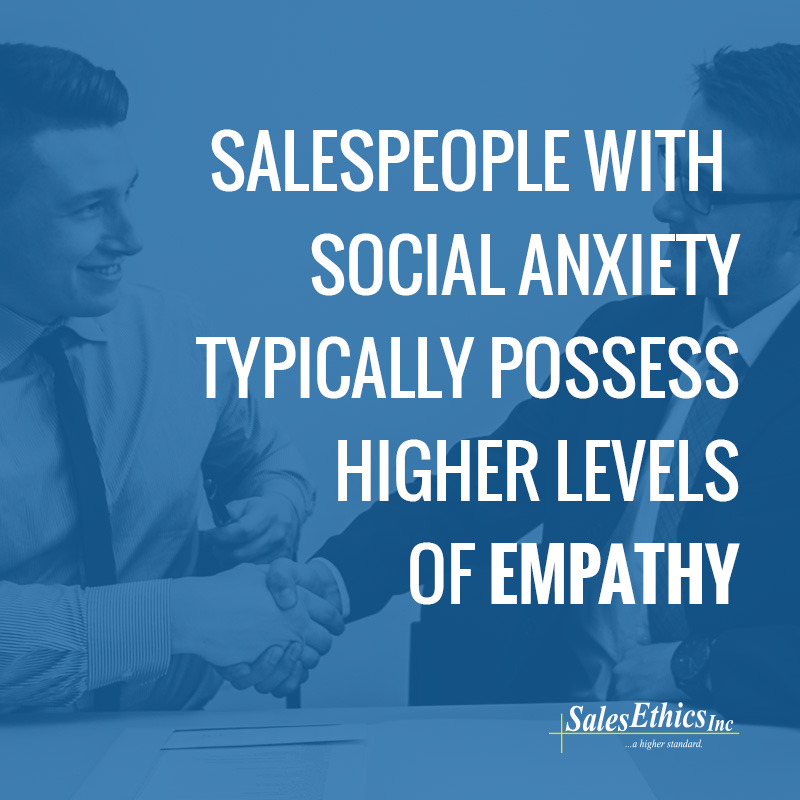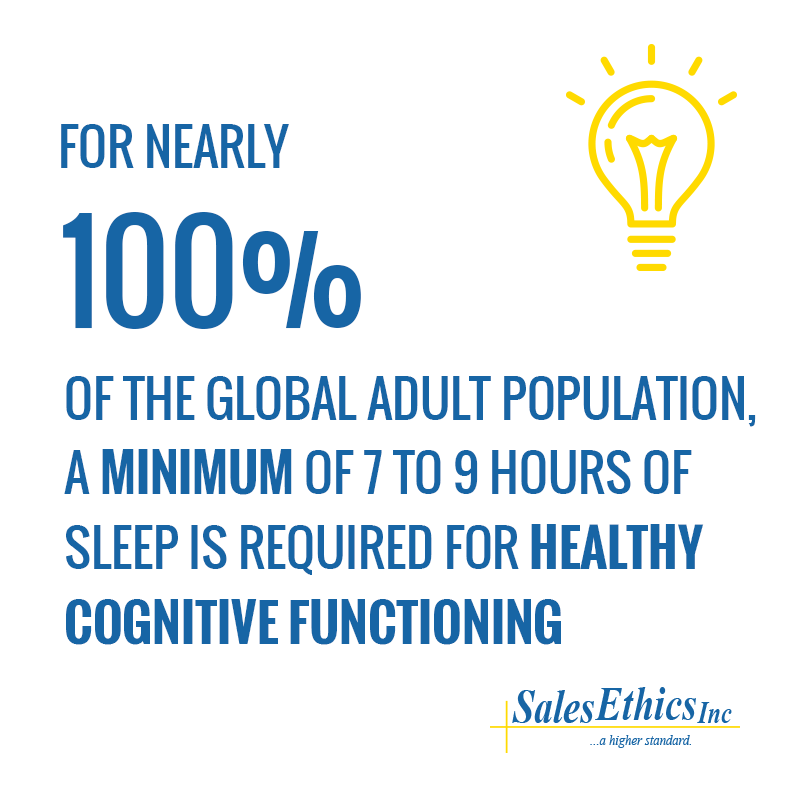
Key Takeaways
Reframe your mindset from "selling" to "helping." Your job is not to trick people; it's to connect them with solutions. This "servant mindset" aligns perfectly with the high empathy that many people with social anxiety naturally possess.
Understand that rejection is not personal. A prospect's "no" is not a rejection of you, but a rejection of the offer. If you've acted with a heart of service, you have done your job correctly, regardless of the outcome.
Create proof to silence your anxiety. Set small, realistic, and measurable goals (like a daily call tracker) to build tangible evidence of your progress, and be open with your manager so you can forge an improvement plan together.
Who this article is for
This article is for talented and empathetic salespeople who suffer from social anxiety disorder (SAD) and are looking for practical steps to overcome their fears and succeed in their careers.
“It’s like there’s this immense weight in my body that just builds, and I feel like I’m practically too scared to move.”
“Some days, the thought of interacting with people, let alone clients, sends me into a panic.”
“I make up endless reasons in my head as to why I shouldn’t contact a lead. Truth is, I’m just terrified of talking to people. I don’t really know why.”
More and more, we’re receiving stories like this from salespeople who suffer from social anxiety disorder (SAD).
Naturally, these stories are troubling. We always hate to hear when a salesperson thinks less of themselves and their talents when they have a genuine passion for the work.
But what’s worse is, with each of these stories, we also hear how these salespeople are terrified to seek help with their struggling performance because they fear being ridiculed by peers and looked down upon — or even fired — by superiors.
Let’s not mince words: Within the sales industry, social anxiety disorder is horribly misunderstood.
And this continued misunderstanding is leading to talented, passionate, and empathetic salespeople — who often have a natural gift for connecting with customers — leaving the industry altogether under the notion that they’re “just not cut out” for sales.
That doesn’t have to be you. We’ve helped salespeople just like you overcome their anxiety, reframe their mindset, and go on to lead successful sales careers.
If you genuinely care about helping people, then you do have what it takes to succeed — even if it doesn’t feel like it right now.
But to truly overcome this, you need to take action through realistic, incremental, and measurable improvements in both your professional and personal life.
So let’s dive in together and learn exactly how you can begin removing social anxiety’s hold on your sales career.
What to Do in Your Professional Life to Overcome Social Anxiety in Sales
Social anxiety is an alienating force, ceaselessly shouting at you that you’re not good enough, that you’re boring or dumb, and that you’re going to fail no matter what.
That’s overwhelming for anyone, but when you couple this anxiety with the stress of a sales role, it can feel downright indomitable.
But don’t worry. We’ve got proven, actionable steps you can put in place (and that we use with the sales reps we help) to reduce the feelings of anxiety and work more effectively.
Reframe your state of mind about sales and your role as a sales representative.
Being in sales sounds and feels “icky” to a lot of people.
Sadly, that icky first impression isn’t entirely undeserved due to the multitude of unscrupulous sales departments and their scandals that dot the headlines practically every other week.
But the truly successful salespeople and the companies that provide successful products for generations aren’t in the business of tricking people.
They’re helpers. They’re carers. They put themselves, every day, in the shoes of those they serve and think: “How can I be of real help here?”
And that’s the key to their success — genuinely putting others before themselves.
As it happens, this is in perfect alignment with the natural disposition of many people who suffer from social anxiety, as they’re naturally more helpful, highly empathetic, and more concerned about the well-being of others.
If you’re chronically stressed about your sales, the biggest service you can do for yourself and your career is this shift to the servant mindset.
Sales, above all, is a connection role. Your job is to find people who can truly use the help that your product or service offers, and connect them to it if it’s in their best interest.
The next time you feel the overwhelm creeping up on you, remember: You’re here to help others.
Your job is to understand the products and services you offer, know exactly how they help solve the problems of your customers, and then operate from a heart of service to connect them to those solutions.
Practice your customer interactions.
Sales call anxiety is a common fear most salespeople struggle with, especially early on in their career.
However, for those with SAD, this fear can be paralyzing, often resulting in total inaction.
Thankfully, by consistently practicing your call openings, and through a little bit of self-analysis, you can quickly establish rapport and a positive first impression.
If you’re having trouble finding a comfortable way to start conversations, talk it over with your sales manager.
They’ve likely got keen insight into your audience and market and can help you improve your conversations with prospects.
As you progress through your calls, emails, messages, and other forms of outreach throughout the day, keep track of how well each was received where possible.
Through this practice, you’ll be able to pick up on which call openings are the most comfortable for you and, above all, which openings best serve your customers and put them at ease.
Understand that prospect rejections aren’t them rejecting you.
You probably can’t count the number of times you’ve heard “Oh, just don’t take the rejection personally.”
Boom. Close your browser. Social anxiety cured, right?
While there’s truth to this adage, the key to actually internalizing this knowledge and applying it to your day-to-day work lies in your mindset and actions.
Know your purpose as a salesperson and that rejection is unavoidable.
If you’re not doing thorough research and pre-qualifying your prospects before reaching out to them, you’re setting yourself up for rejection.
However, even with thorough research, preparation, and flawless interactions, your products or services may simply just be a poor fit for that person.
In these instances, your mindset of service is critical to not internalizing these interactions as an outright failure on your part.
When — not if — you receive these rejections, you need to remind yourself that you’re here to be of service to people who have a problem that you can help solve.
More importantly, you must reflect on your duty as a salesperson: to always act in the best interests of your customers and prospects.
If you know you’ve done your utmost to be of service and you ultimately still receive a rejection, then rest easy. You’ve done your job well and performed from a genuine heart of service.
Prep yourself for the next call and keep on working.
Be mindful of your self-talk and how you treat yourself.
When we feel like we’ve failed, it’s easy — especially for those with SAD — to internalize the rejection as a deeply personal failure and give ourselves a mental and emotional wallop.
“I knew it. They couldn’t stand me the entire time and I looked plain foolish.”
“Everyone else just glides through their quota. I’m a failure.”
But this kind of self-talk can have extremely negative mental, emotional, and even physical consequences over the long-term.
Rather, substitute negative self-talk with realistic, specific, goal-oriented self-talk:
“I’m actively improving in my prospect outreach by making ____ calls each day.”
“I’m building positive, trust-based relationships with my customers by reliably following up on my emails and calls each day.”
“I’m a benefit to my customers by helping them solve their problem of ________”
This simple practice might feel a little corny at first, but over time, it’s proven to put you on a better mental and emotional path to success.
Set realistic, measurable goals for yourself.
When we feel motivated, we tend to want to change everything about our lives that we don’t like all at once.
Spoiler alert: You’re likely going to fail if you try and change your life this way. And if you do, you’re just going to feel completely de-motivated all over again.
As humans, we’re not wired to make large-scale changes, across every area of our lives, all at the same time.
We do our best self-improvement work when we make small, measurable, realistic goals that make sense.
Is your social anxiety a major stumbling block for you when reaching out to new prospects? Set a target for the number of calls you want to achieve that day and use a simple spreadsheet to keep track of your progress.
Or, better yet, use the one we’ve developed here:
Above all, by measuring your progress and the active change you’re making, you start silencing the lies that social anxiety tries to tell you.
With this, you can actively look at your progress and see that you’re not lazy, incapable, inept, or stupid.
You can perform at a high level. You can make meaningful contact with prospects. You can form trusted-based relationships with customers.
And now, you’ll have the proof right there in front of you.
Be honest and open with your sales manager.
You might be in a position, like many salespeople, where you feel trapped when it comes to talking about your social anxiety and how it’s affecting your performance with your sales manager.
You know there’s a problem, you know you probably should have brought it up sooner with them, and now you feel like it’s too late.
And you’re convinced you already know the outcome: They’ll be furious and you’ll be out of a job, right?
This couldn’t be further from the truth. Your sales manager is in your corner. They want you to succeed in your role.
Now, mind you, we’re not saying this conversation will be easy.
But odds are that your sales manager will be thankful you had the courage and initiative to bring this issue to them, as it shows a genuine desire to improve and the drive to actually put in the work to do so.
No matter how your conversation goes, in the end, your sales manager will have greater clarity into why your performance has been lower, and together, you can forge an actionable plan of improvement.
Get professional sales coaching.
Getting the perspective of a skilled, unbiased third party is invaluable when trying to make a lasting change in your career.
And we’re proud to have helped countless salespeople just like you learn how to work with their social anxiety and lead successful sales careers.
Through our personalized, one-on-one coaching sessions based around the SalesEthics 4-Step Plan, you’ll:
Learn exactly where improvement is needed in your sales process
Receive a personalized, easy-to-follow development plan
Work alongside your SalesEthics coach in implementing your plan
Continually improve through analysis and course correction sessions
By working together with your personal sales coach, you’ll be able to see just how capable you are and every day, you’ll see the progress you’re making towards revitalizing your career, your self-talk, and your performance.
What to Do in Your Personal Life to Overcome Social Anxiety in Sales
We’ve covered some solid practices you can use while at work that can help you curb your social anxiety and work toward professional improvement.
But for lasting change that sets the foundation for consistent high performance, reduced anxiety, and career success, the secret lies in investing in your personal development as well.
Eat a balanced diet.
It may seem like the same old message you’ve heard in the after-school specials, but you really are what you eat.
Your nutrition has a profound impact not only on your physical well-being, but your emotional and mental state as well.
When it comes to anxiety and depression specifically, it’s been proven that poor diet can greatly amplify the effects of social anxiety disorder and the severity of one’s depressive state.
To combat this, a balanced diet that’s rich with vegetables and other leafy greens is shown to have a remarkable effect in elevating mood, curbing anxiety and depressive symptoms, and promoting a generally higher sense of overall well-being.
Avoid alcohol and other drugs.
When Friday rolls around and the hour hand on the clock strikes 5 P.M., it might feel tempting to go out for a round of drinks with the rest of the team.
But if you struggle with social anxiety, you may want to reconsider that weekend outing if you’re serious about succeeding in sales.
Alcohol, though commonly considered a “social lubricant,” is, in fact, a depressant — and an extremely potent one at that.
For those who struggle with anxiety and depressive disorders, this can often spell a worsening of symptoms.
Moreover, new research points to a significant link between social anxiety disorder and alcohol use disorder (AUD) — with each strongly reinforcing one another.
You might be worried that you’re missing out on an important team bonding experience, but in reality, you’re only damaging your chances at building consistent success.
Exercise on a regular basis.
Please know that when we recommend you get regular exercise, we’re not recommending that you become Thor, guardian of the sales department.
But what we are recommending is regular exercise, based on proven science, that shows the link between increased physical activity and decreased social anxiety symptoms.
Even just walking for 20 to 30 minutes each day can help alleviate anxiety, promote a greater sense of overall well-begin, and positively influence your outlook on life.
If you’re unsure of where to start, just start with walking on your lunch break. This is a quick, easy-to-stick-to change that you can begin adapting into your life right now and yield tremendous rewards throughout your lifetime.
Get adequate sleep.
Improving your sleep is among one of the most — if not the most — positive changes you can make when seeking to improve your sales performance and curb the symptoms of your social anxiety disorder.
But why?
For nearly 100% of the global adult population, a minimum of 7 to 9 hours of sleep is required for healthy cognitive functioning, restoration of tissues, and for a host of other vital functions to be carried out effectively.
However, when this sleep is missed, you set yourself up for failure, as the quality and duration of your sleep is inextricably linked to social withdraw, loneliness, depressive thoughts, and a worsening of social anxiety symptoms.
To promote more restful sleep at night, here are a few quick, science-backed tips from Dr. Matthew Walker, a leading sleep researcher at UC Berkeley:
Stick to a sleep schedule, even on the weekends.
Avoid caffeine, nicotine, and alcoholic drinks
Don’t partake in large meals or drinks at night.
Don’t nap after 3:00PM
Have a wind-down ritual at least 30 minutes before bed.
Your bedroom should be cool, dark, and devoid of gadgets.
Try to get at least 30 minutes of direct sunlight per day.
Don’t fall into the comparison trap on social media.
Social media has enabled us to connect with more prospects, perform more in-depth research, and always be just a click away for customers who might need help.
But through this convenience and hyperconnectivity also comes a downside. It’s easier than ever to fall into one of the most potent triggers of social anxiety: the comparison trap.
Simply put, when you’re scrolling through social media feeds of your friends, prospects, and especially your peers, you see their seemingly perfect careers, cascades of accomplishments, and near-perfect family lives.
In consuming this media constantly, it’s easy to fall into the trap of thinking you’re not good enough, successful enough, or knowledgeable enough.
In turn, this trap can quickly trigger symptoms within those suffering from SAD.
The best way to avoid this altogether is to greatly limit your time consuming social media. And according to the latest research, the more you can cut, the better.
If your sales role requires the use of social media regularly, remember: You’re only seeing the highly-curated snapshots of their most ideal moments in life.
While you’re judging them based on the select moments they have chosen to share, you’re judging yourself based on your internal thoughts, intentions, and motivations.
No matter how well or how poorly you’re doing in life, you’ll always be able to find someone doing better or worse than you, so stay focused on your customers and on improving your performance.
We’re Here with You on Your Journey to Overcome Social Anxiety in Sales
There’s no question that, for those who suffer from it, social anxiety disorder can feel like an indomitable force.
Now, make no mistake: The road ahead won’t be easy.
But, as we’ve seen through the transformed lives of salespeople we’ve helped throughout the years, you can overcome this and enjoy a truly fulfilling career.
Whether you’re a young salesperson just getting started in the field, or if you’re a seasoned vet in a new territory or industry, we’re right here with you on this journey.
Let’s work together to overcome your anxiety, build trust with customers, and create a career you’re proud of.
I’m ready to end social anxiety’s control over my career.
Talk with your SalesEthics coachThe information, including but not limited to, text, graphics, images, whitepapers, presentations, and other material contained on this article and website are for informational purposes only. No information on this site is intended to be a substitute for professional medical insight, advice, assistance, diagnosis, or treatment. Always seek the advice of a physician or other qualified healthcare provider with any questions you have regarding a medical condition, diagnosis, symptom, or treatment and before undertaking a new health care regimen, and never disregard professional medical advice.







